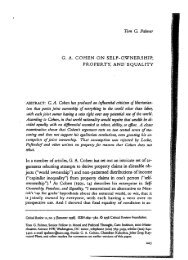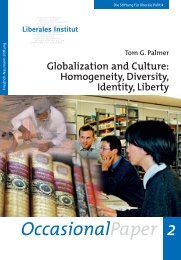Are Patents and Copyrights Morally Justified? - Tom G. Palmer
Are Patents and Copyrights Morally Justified? - Tom G. Palmer
Are Patents and Copyrights Morally Justified? - Tom G. Palmer
Create successful ePaper yourself
Turn your PDF publications into a flip-book with our unique Google optimized e-Paper software.
830 Harvard Journal of Law & Public Policy [Vol. 13<br />
same invention, but one will beat the other to the patent office<br />
by an hour or a day <strong>and</strong> will acquire an exclusivemonopoiy,<br />
while the loser’s work will be totally wasted. . . . Since<br />
the issue is one of commercial rights, the loser in a case of<br />
that kind has to accept the fact that in seeking to trade with<br />
others he must face the possibility of a competitor winning<br />
the race, which is true of all types of competition. 49<br />
This idea does not comport well with her earlier claim that intellectual<br />
property rights are natural rights that are merely recognized—not<br />
granted—by government; in this case a full<br />
monopoly is awarded by government to one inventor, while another<br />
with a claim equally valid in every respect exceptfor a ten<br />
minute lead time at the patent office is denied any right to exploit<br />
the invention.<br />
Spooner offers a very different response to the problem:<br />
[T]he fact that two men produce the same invention, is a<br />
very good reason why the invention should belong to both;<br />
but it is no reason at all why both should be deprived of it.<br />
If two men produce the same invention, each has an equal<br />
right to it; because each has an equalright to the fruits of his<br />
labor. Neithercan deny the right ofthe other, without denying<br />
his own. 50<br />
What if, however, one of the inventors gives this right to the<br />
rest of mankind? As Leggett argued, in the case of authorship,<br />
Two authors, without concert or intercommunion, may describe<br />
the same incidents, in language so nearly identical<br />
that the two books, for all purposes of sale, shall be the<br />
same. Yet one writer may make a free gift of his production<br />
to the public, may throw it open in common; <strong>and</strong> then what<br />
becomes of the other’s right of property? 5 ’<br />
The same argument can be extended, of course, to inventions.<br />
Liberty <strong>and</strong> intellectual property seem to be at odds, for<br />
while property in tangible objects limits actions only with respect<br />
to particular goods, property in ideal objects restricts an<br />
entire range of actions unlimited by place or time, involving<br />
legitimately owned property (VCRs, tape recorders, typewriters,<br />
the human voice, <strong>and</strong> more) by all but those privileged to<br />
receive monopoly grants from the state. To those who might<br />
49. R<strong>and</strong>, .supra note 29, at 133.<br />
50. Spooner, supra note 2, at 68; see also R. Nozicx. supra note 37, at 182.<br />
51. W. LEOGETF, supra note 43, at 402.











